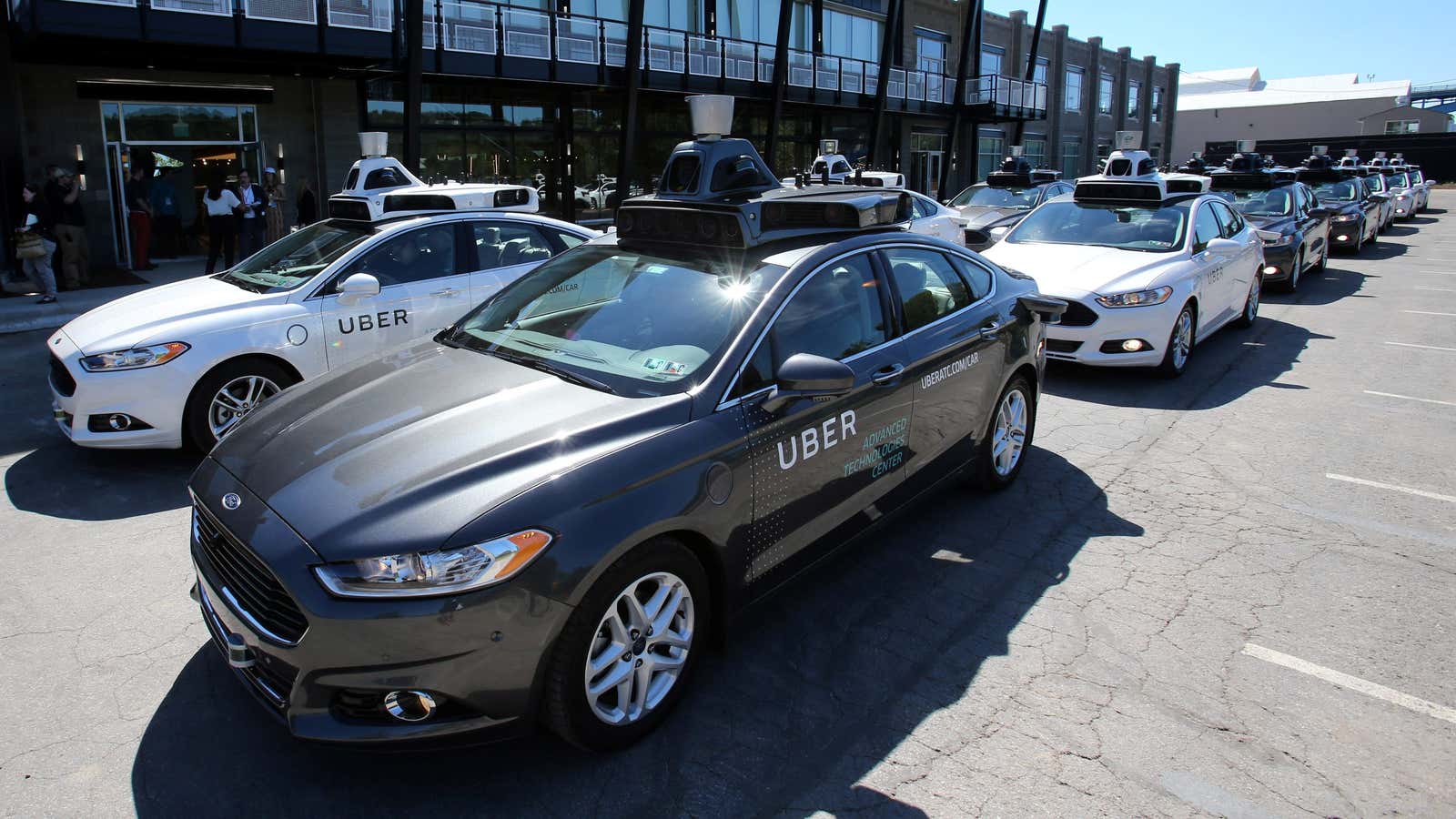Uber has raised a fresh $1 billion for its driverless cars business from three Japanese investors: Softbank’s Vision Fund, Toyota, and auto-parts maker Denso. The financing establishes Uber’s self-driving cars unit as its own corporate entity, valued at $7.25 billion, the company said in a press release on April 18.
Lest you are confused, Uber completed this financing for its driverless cars business within a week of filing paperwork for a widely anticipated initial public offering. The IPO is another mechanism through which Uber hopes to raise money.
Why raise a $1 billion from private investors and restructure part of the business so close to an IPO? The most obvious answer in this case is probably also the right one: Uber desperately needs the cash.
Nothing Uber is trying to do—become the go-to platform for personal mobility, create the world’s leading food delivery service, and so on—is cheap, and developing driverless cars is no exception. The long-term vision is that autonomous vehicles would make Uber’s core ride-hailing and food delivery businesses more profitable by allowing the company to eliminate its single biggest expense: human drivers. In 2018, Uber made $997 million thanks to a one-time impact of selling its international businesses; the year before that, it lost $4 billion.
In 2018, Uber spent $457 million on its autonomous vehicle unit, the Advanced Technologies Group (ATG), up 19% from the previous year. From 2016 through 2018, all the years for which Uber broke out its research and development spending in its IPO filing, the company poured $1.1 billion into ATG, or roughly 30% of its entire research and development budget.
If Uber simply maintained its current rate of spending, the $1 billion it raised from Softbank, Toyota, and Denso would be depleted in about two years. But two years may not be enough runway. Uber said in its IPO filing that it expects competitors will beat it to developing autonomous technologies. It cited Waymo’s December 2018 launch of a commercial ride-hail service that uses self-driving cars, Waymo One, in Phoenix, Arizona.
Uber also admitted in its IPO filing that it could face continued fallout from the trade secrets lawsuit it settled with Waymo and parent company Alphabet in February 2018, including licensing fees or design changes that could substantially delay its production of autonomous vehicles.
Uber founded ATG in 2015 in Pittsburgh after gutting Carnegie Mellon University’s robotics center for talent. In August 2016, Uber acquired driverless trucking startup Otto and its founder, wunderkind engineer Anthony Levandowski, to further jumpstart its autonomous ambitions. (Levandowski would later become the leading villain in Waymo’s trade secrets claims against Uber, having previously worked at Waymo.) In September 2016, Uber unveiled its self-driving cars in a frenzied media event in Pittsburgh and put four of the vehicles into service for a small group of loyal local users.
Like much of what Uber did in those early years, the driverless program was built on shaky ground, and when Waymo sued in February 2017, it was unclear whether Uber’s driverless program would survive. The uncertainty compounded after a self-driving Uber struck and killed a woman in Tempe, Arizona, in the first-known pedestrian fatality to involve an autonomous vehicle. The incident led Uber to suspend all tests of driverless cars on US public roads for nine months, and to lay off most of its autonomous vehicle operators.
In August 2018, the New York Times reported (paywall) that Uber CEO Dara Khosrowshahi had considered shuttering ATG altogether when he took over from co-founder Travis Kalanick in August 2017. The Times reported that Khosrowshahi was “undecided” on the fate of the division, and had started talking to automakers and suppliers about possible partnerships. At a conference in September 2018, Khosrowshahi pushed back on claims that he planned to sell ATG, calling it a “big asset that we are building and we can monetize.”
The latest $1 billion deal consists of $667 million from Toyota and Denso, and $333 million from Softbank, the companies said in their press release. Toyota previously invested $500 million in Uber in August 2018 and could contribute up to $300 million more over the next three years. The deal is expected to close in the third quarter of 2019.
The Wall Street Journal reported (paywall) that Uber will control six board seats of the newly created ATG entity, while Toyota and Softbank will get one each. The unit’s expenses will remain with Uber.
Find out what companies offer rideshare insurance for Uber from G/O’s media partner:
Quartz is not involved in creating these articles but may receive a commission from purchases through its content:
Guide to Rideshare Insurance
Best Auto Insurance
Cheapest Vehicle Insurance
How to Switch Car Insurance
.
